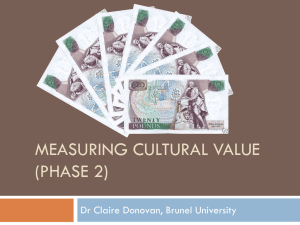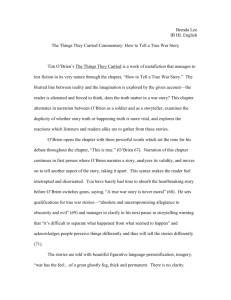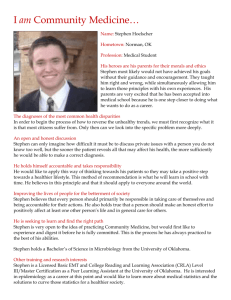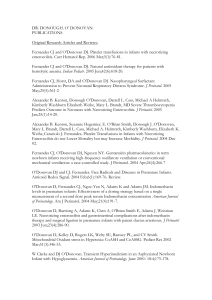220101 - The Debating Group
advertisement
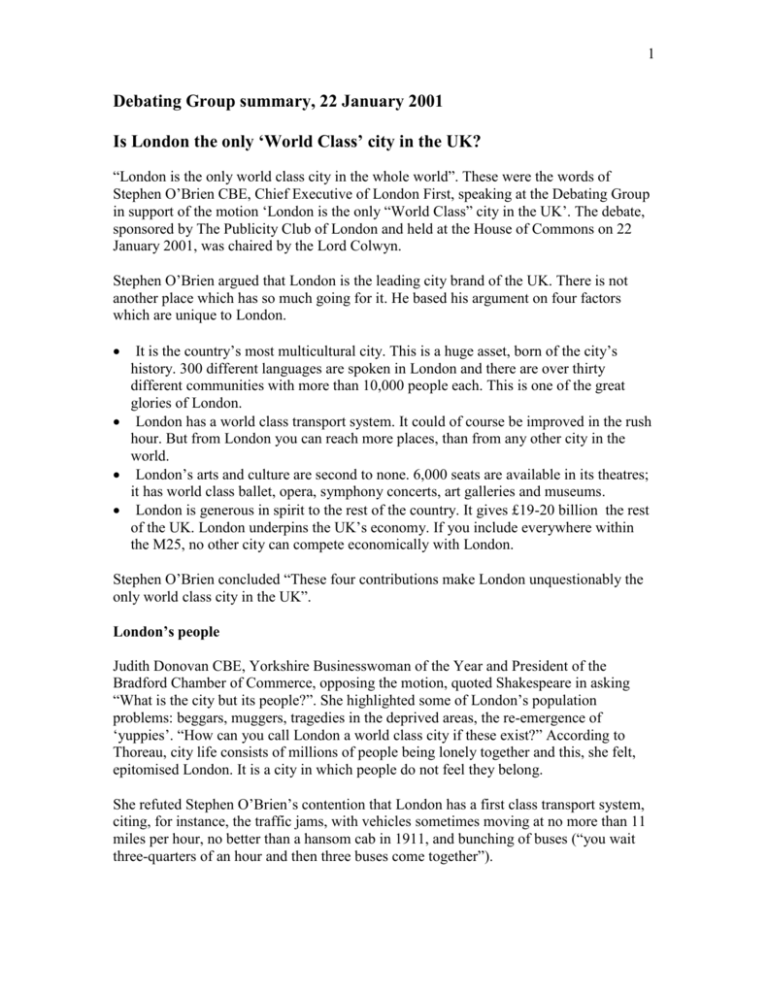
1 Debating Group summary, 22 January 2001 Is London the only ‘World Class’ city in the UK? “London is the only world class city in the whole world”. These were the words of Stephen O’Brien CBE, Chief Executive of London First, speaking at the Debating Group in support of the motion ‘London is the only “World Class” city in the UK’. The debate, sponsored by The Publicity Club of London and held at the House of Commons on 22 January 2001, was chaired by the Lord Colwyn. Stephen O’Brien argued that London is the leading city brand of the UK. There is not another place which has so much going for it. He based his argument on four factors which are unique to London. It is the country’s most multicultural city. This is a huge asset, born of the city’s history. 300 different languages are spoken in London and there are over thirty different communities with more than 10,000 people each. This is one of the great glories of London. London has a world class transport system. It could of course be improved in the rush hour. But from London you can reach more places, than from any other city in the world. London’s arts and culture are second to none. 6,000 seats are available in its theatres; it has world class ballet, opera, symphony concerts, art galleries and museums. London is generous in spirit to the rest of the country. It gives £19-20 billion the rest of the UK. London underpins the UK’s economy. If you include everywhere within the M25, no other city can compete economically with London. Stephen O’Brien concluded “These four contributions make London unquestionably the only world class city in the UK”. London’s people Judith Donovan CBE, Yorkshire Businesswoman of the Year and President of the Bradford Chamber of Commerce, opposing the motion, quoted Shakespeare in asking “What is the city but its people?”. She highlighted some of London’s population problems: beggars, muggers, tragedies in the deprived areas, the re-emergence of ‘yuppies’. “How can you call London a world class city if these exist?” According to Thoreau, city life consists of millions of people being lonely together and this, she felt, epitomised London. It is a city in which people do not feel they belong. She refuted Stephen O’Brien’s contention that London has a first class transport system, citing, for instance, the traffic jams, with vehicles sometimes moving at no more than 11 miles per hour, no better than a hansom cab in 1911, and bunching of buses (“you wait three-quarters of an hour and then three buses come together”). 2 “There is wonderful architecture in London, if you are an architect”, she argued. “Are you proud of the Dome, the British Library, Wembley Stadium?” The economy of the City is magnificent, but it overlooks some of the poorest wards in London, where people are starving and have nowhere to sleep. London cannot afford to house its teachers. The middle class have been driven out of London and without them you do not have a stable population. The affair of the Mayoral elections was embarrassing for the whole country. Indeed, London is a story of “embarrassing buildings and disastrous politics. It has however a great heritage and tourists respond to its nostalgia. It is easier to talk about the past than the future. It is, in fact, a world class theme park”. On the question of London’s economy, Judith Donovan pointed out that Britain's money is re-distributed. It belongs to all of us. London is certainly not the only world class city in the UK – Edinburgh can also claim to be a world class city. Judith Donovan quoted Lord Balfour's words “London is a splendid place to live in for those who can get out of it”. She concluded: “London isn’t working”. The City Seconding the motion, Tony Halmos, Director of PR at the Corporation of London, refuted the notion that the middle class has left London. It has left inner London. London’s population is, in fact, rising. He acknowledged that London has problems with factors such as transport and shortage of teachers. Nonetheless it has various characteristics which uniquely enable it to be classed as a world class city. He enumerated the factors which characterise such a description: Culture Tourism Economy A centre of government and decision-making An international financial centre. London qualifies on all these counts. Much more so than other cities eg New York, Tokyo, Berlin, Paris. Los Angeles or Hong Kong. The description world class is not about London’s problems, but about its dominance in the world economy and society. One of the reasons that London has problems is because it raises a great deal of income, some generated by tourism. 3 There is more manufacturing in London than in any other part of the UK. There are 4½ million people in the workplace. The City is London’s financial centre with 550 foreign banks. It is the centre of financial power: shipping insurance, banking. Edinburgh may be an important economic centre, but it is small compared with London, certainly not world class. If you are in the world marketplace you need to be close to people who are providing financial services, where decisions are made and you have access to people across all skill levels. “In terms of seeking business in a world class city, only one place qualifies – London”. Size Seconding the opposition, Austin Mitchell, MP for Great Grimsby, argued that being a world class city was not just a question of size. “A world class city is a place where it is good to live and good to work and which generates economic activity”. Population pressures, crowded housing conditions and the dreariness of many of its suburbs means that there are much better places to live and work in than London. “London is big – far too big to be a city to live in. So much has to be spent to prevent London sinking eg the Thames Barrier”. Austin Mitchell enumerated the refugees, the transport system, crowded traffic conditions, congestion and crime. “London is overcrowded and unpleasant. The services are so bad because no one can afford to live in London”. In terms of culture cities like Leeds, Glasgow, Edinburgh and Birmingham provide cultural opportunities at prices that real people could afford. Moreover from these cities you can easily get out to the countryside. Austin Mitchell argued that London is a drain to this country. It causes inflation because of the high cost of housing and the rest of the country has to pay a price through higher interest rates. A good society is where power is distributed across centres. Britain is not a good society because it is drained by London “The only thing you can say for London is that it is big – too bloody big”. Discussion from the floor For Quoting Johnson: “When a man is tired of London, he is tired of life” the speaker cited London humour, the huge cultural opportunities, wonderful buildings, great historical heritage and beautiful parklands. The problems of London are small compared with those of other cities in the world. London does not get a good press because the press is based in London and it reports on what is near to it. Organisations and people come to London from all parts of the world to learn their crafts. 4 London is not just its centre. There are many areas of London with their own culture and history. There may be crime in London but many classic crimes have been committed in the North of England eg the Moors Murders, Dr Shipman and the Yorkshire Ripper. Many of the views about London were personal and subjective. A professional, wellestablished model which defines excellence and enables a city to be scored on measures of excellence exists. An organisation called London Excellence is working to this model. The speaker sees London as a brand and asked how the rest of the world perceives it. In her travels throughout the world she has found that everyone wants to come to London and work here. This perception makes London a world class city. London’s press is a national press. No other city in the UK can claim that right. Against We have devalued and continue to devalue the word ‘city’. There are many reasons why London is no longer world class. The speaker blamed Ken Livingstone. London is not the only world class city. It might be the best city in the UK, but it is not the only world class one. London is not the only world class city – Edinburgh, the Athens of the North, is a world class city Most of the country is controlled by MPs from outside London who are based there. London cannot be classed as a world class city if its mayor cannot sit down with the Secretary of State for Transport & the Environment to discuss issues. Excellence equates with customer satisfaction. Is the customer truly satisfied with living in London? London has world class potential, but how can it be world class without correcting its problems? Summing up In summing up for the opposition Judith Donovan refuted many of the points that had been raised: Arts and cultures: these are things which every city should have. Generous spirit: most of the money coming from London belongs to people outside London in the first place. A capital city must be a world city, but world class is about benchmarking and excellence. Humour: she pointed to Yorkshire humour. London is a strong brand, based on heritage and nostalgia. But this is for tourists. As a place to live there is a better quality of life outside London. Judith Donovan concluded that she is proud to be a Freeman of London. The city belongs to everyone. But until it brings hope to the disadvantaged and get its infrastructure sorted out, it cannot be classed as a world class city. 5 Summing up for the motion Stephen O’Brien pointed out that the beggars and lonely people in London come from outside the city. He felt it was very important for a world class city to have a mayor and cited the picture of the mayors of London and New York – two world class cities – which had been published in the Financial Times. One of the great things about London is that it keeps reinventing itself. Stephen O’Brien cited the Tate Modern, the London Eye, the Croydon tram link and the new park in Mile End as evidence of re-invention. He believes this is a characteristic of a world class city. Result For the first time in the history of the Debating Group the result was a tie – 45 for and 45 against the motion.
